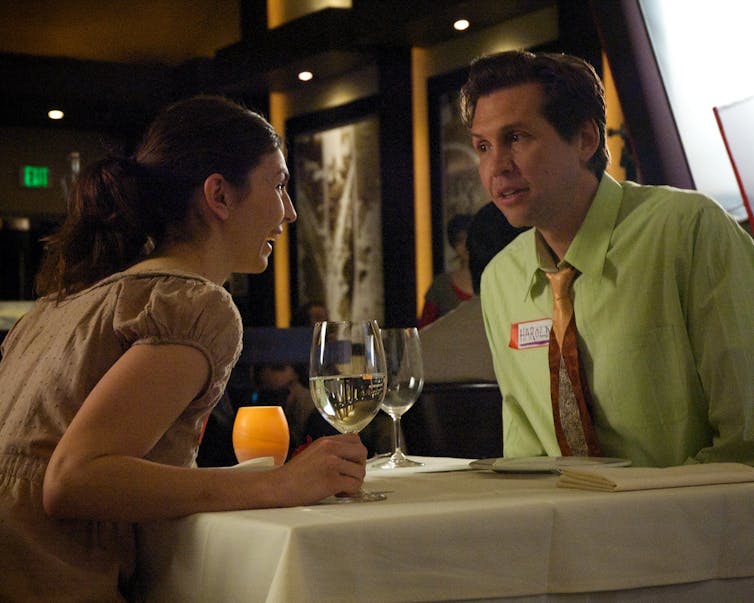We all know somebody like Dick: a bloke who rates himself for no apparent reason and who optimistically reckons every woman – especially every attractive woman – is interested in him.
Most of us have met somebody like Sally too; a woman oblivious to her own attractiveness who seems to have Dicks orbiting her like ponderous moons around a particularly sunny planet.
Sure, Dick and Sally are blunt stereotypes, but that doesn’t mean they aren’t also real people. In fact, it’s people just like Dick and Sally that are the focus of a new study by University of Texas researchers.
As any adolescent could tell you, negotiating sexual interest is a real minefield. Fail to recognise those flickering sparks and the only thing you’ll be kissing is the back of your hand. But over-interpret a small gesture or kind word and you could make a massive fool of yourself.
These problems of over- or under-estimating another’s sexual or romantic interest are not confined to teenagers. Experiments by evolutionary psychologists have, for some time, been showing us what we always suspected: men tend to think women are more interested than they really are.
The reasons can be found in Error Management Theory, a body of ideas developed by evolutionary psychologists, Martie Haselton and David Buss. Basically, in an ambiguous situation, the costs of playing it safe are not the same as the costs of throwing caution to the wind.

Most of us, when we hear a rustling in the grass, tend to tread carefully in order to avoid a potentially deadly confrontation with a snake. Our caution might slow us up more often than is necessary, but that is much better than being bitten by a venomous serpent. Throughout history, a tendency to overestimate the danger of snakebite kept our ancestors safe. Meanwhile, folks who underestimated the peril died, as did their carefree genes.
In much the same way, Haselton and Buss argued that men and women have, throughout history, suffered different costs of over-estimating or under-estimating sexual interest. Guys who were too cautious missed out on chances to mate. Men who overestimated women’s interest suffered no more than embarrassment, but they never died wondering.
These are the men from whom we mostly descend.
A woman’s evolutionary fitness depends less on the number of sexual partners she has than a man’s does. Deterring unwanted suitors and choosing the best among those on offer have always been the main challenges for our female ancestors. Women who weren’t cautious enough could end up pregnant to the wrong kind of guy.
This kind of “men are over-keen, women are over-cautious” message often attracts heat for merely reinforcing old, oppressive, stereotypes. But evolutionary psychology is at its best when it reveals where those stereotypes come from, and why not everybody conforms.
For this reason, the new paper by University of Texas scientists Carin Perilloux, Judith Easton and David Buss is very valuable.
Perilloux, Easton and Buss set out to measure the differences between how individual men and women over- or under-estimate sexual interest from members of the opposite sex. To do so, they set up “speed-meetings” where every woman met each of five men for a short time, and every man met each of five women.
The subjects provided a lot of information about themselves, rated the attractiveness of each person they met, and estimated the sexual interest shown by each person they met.

As expected, the men tended to overestimate how interested each woman was, and the women tended to underestimate how interested each man was. The effect was so strong, it reminded me of comedian Larry Miller’s quip:
“If women knew – if they even had the slightest idea – of what men were thinking, they’d never stop slapping us.”
Men’s mistakes, it turns out, aren’t some simplistic curse of the Y-chromosome. Men who report being keen for a brief fling tended to overestimate women’s sexual interest. So did men who rated themselves – and especially their bodies – as attractive. But the men that women actually were attracted to tended to underestimate these women’s interest.
The errors that men made depended, too, on the woman’s attractiveness. The more attractive she was to him, the greater the chance he would overestimate her interest.
The study revealed less about which women were most likely to underestimate men’s interest. Women interested in or open to a short fling were neither more nor less likely to underestimate mens’ interest. Unfortunately the paper doesn’t say if women’s attractiveness tends to predict whether they are more or less likely to misperceive the level of interest from men. Information of this type would certainly be fascinating.
Evolutionary biology is revealing ever more about the complex push and pull between cooperation and conflict at the heart of our sexual relationships. Psychology is starting to show that we have an enormous capacity to deceive ourselves – all the better to manipulate and lie to others.
I am sure we will soon see clever experiments that ask whether women underestimate their own levels of sexual interest, lying to themselves in order to better deceive the men who orbit them. Likewise, do men deceive themselves into thinking they are keener, or smarter, or better looking than they really are in order to make more convincing suitors?
I think we all know a few people like that.
Rob Brooks is the author of Sex, Genes & Rock ‘n’ Roll: How evolution has shaped the modern world (NewSouth Books).

